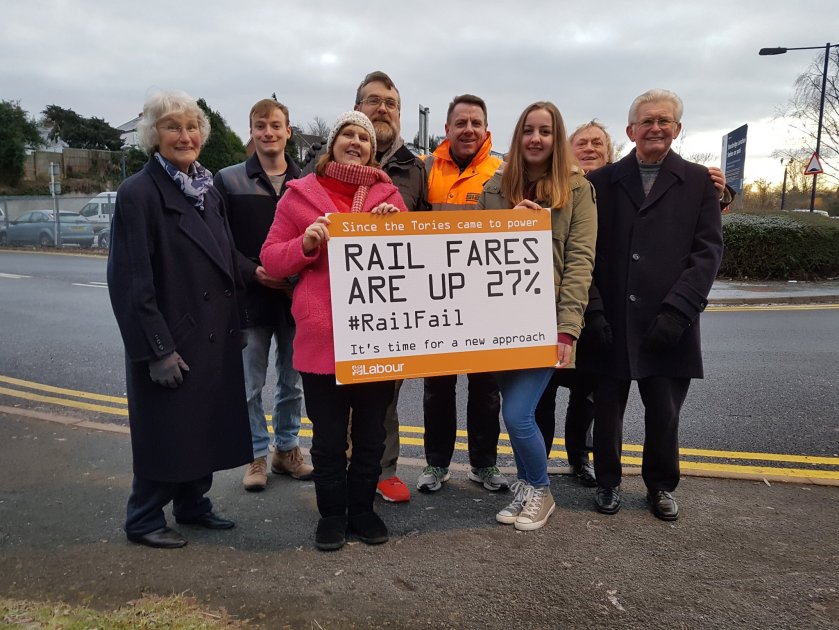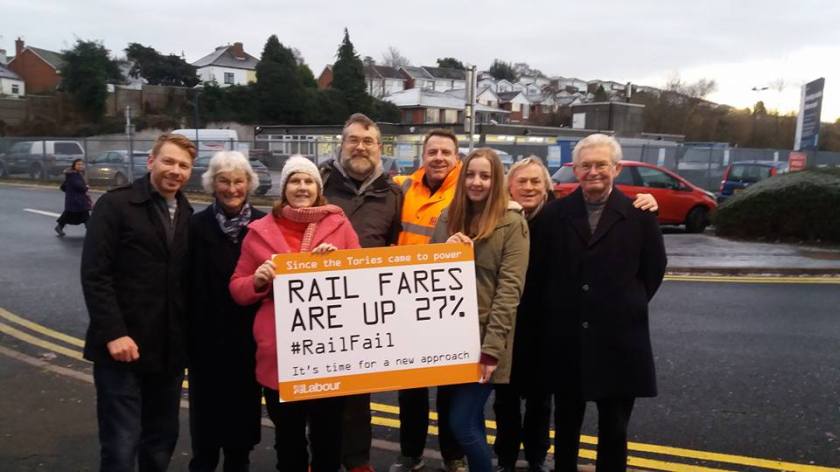 Last month (19/20th November), the first National Policy Forum meeting in over two years was held in Loughborough. Given this, we thought it would be useful to reproduce a report of the meeting by NEC member Ann Black:
Last month (19/20th November), the first National Policy Forum meeting in over two years was held in Loughborough. Given this, we thought it would be useful to reproduce a report of the meeting by NEC member Ann Black:
This was the first national policy forum meeting since July 2014 when we agreed our general election manifesto in a spirit of comradeship and optimism. Ann Cryer was elected as Chair, Shabana Mahmood as vice-chair from the MPs/councillors section, and Mick Whelan of ASLEF from the affiliates section, all unanimously. In the constituency section Katrina Murray was elected with 76 votes ahead of George McManus with 31 votes, four spoilt papers and some abstentions. I nominated and voted for George.
Jeremy Corbyn opened by stressing that the old certainties were falling away, and there was no more business-as-usual. Labour’s task was to restore hope and stand against divisions and hate crimes whipped up by the hard right. The Tories were taking Britain backwards, cutting £5 billion from adult social care and leaving 120,000 children in temporary accommodation. On Brexit, Labour would respect the decision of the British people, while ensuring full rights for European Union citizens in the UK and British citizens in Europe: people were not pawns. Labour would bring forward positive policies: creating a million good jobs, ending the undercutting of pay and conditions, a living wage of more than £10 per hour by 2020, rent controls and secure tenancies in the private sector, restoring employment rights from day one, scrapping tribunal charges, insourcing council services, ending privatisation in the NHS, placing conflict resolution at the heart of foreign policy, and safeguarding the future of the planet against climate change. We were ready for a general election whenever it was called.
Responding to questions, he promised that he and John McDonnell would re-issue letters to Labour councils to confirm that they cannot set illegal budgets, despite their dire situation. The blame lay squarely with the Tory government. He acknowledged low morale in the NHS, and agreed with the need to reduce prisoners’ reoffending rates. On migration, published figures were skewed by including students, many of whom returned home after qualifying, and tackling exploitation of workers from abroad was key to winning public support. Asked what Labour offered the 90% who were neither at the top nor the bottom, he said that everyone depended on good public services, and middle-class children were still living with their parents, unable to afford their own homes or pursue their chosen careers. Members agreed with his distrust of “progressive alliances” and asked him to persuade his shadow cabinet colleagues likewise.
Front Bench Presentations
Many shadow cabinet members attended, including Keir Starmer, shadow minister for Brexit. He said that most governments put national security at the head of their priorities, followed by jobs and the economy. Instead Theresa May had chosen, unforgivably, to make immigration the top issue. While Labour accepted the result of the referendum, the Tories had no mandate for the extreme form of Brexit currently being pursued, or for abandoning the single market, and their approach was confused and chaotic. Labour would continue to defend workplace, consumer and human rights in the negotiations to come.
Rebecca Long-Bailey, shadow chief secretary to the treasury, led a discussion on economic policy in the run-up to the autumn statement. Some Forum members suggested that November’s national campaign day should have focused on jobs and the economy, where Labour needed to improve on its 15% public confidence rating, rather than on health, where the party continues to score highly except for questions about where the money will come from. Perhaps next time.
Policy Seminars
The weekend allowed Forum members to discuss policy areas in detail, within the framework of Jeremy Corbyn’s ten pledges from his leadership campaign. The aim was to identify key priorities for debate through to 2020, but also to consider what our manifesto might include if an early general election was called. We could each attend four sessions, and I chose –
Work, Pensions and Equality. Debbie Abrahams, shadow secretary for work and pensions, outlined a vision for systems of social security which would be relevant to everyone. Labour would replace the discredited work capability assessments with personalised support for disabled people, and scrap punitive sanctions. This approach was welcomed, though members recognised the need for a compelling narrative which stressed that as children, parents, workers and pensioners, we all rely on social security at times. There were concerns about the steep rise in self-employment, and how much of it was voluntary rather than a way of removing people’s employment rights.
Labour had not yet taken a position on the triple lock, whereby the state pension increases annually in line with the consumer price index or average earnings or by 2.5%, whichever is the highest. The difficulty is that support for older people can be at the expense of younger people, paying high tuition fees, receiving lower pay and benefits, and unable to buy their own homes. Any change would have to be demonstrated as fairness across generations, where older people can see the value to their children and grandchildren. [update: on 29 November Rebecca Long-Bailey announced that Labour would maintain the triple lock through to 2025.] Equality was also important, with women hit disproportionately by changes in public spending since 2010, and the gender pay gap persisting.
Environment, Energy and Culture. Global warming emerged as a key theme, with strong support for renewable energy sources, and for better education on the extent of the dangers and the action necessary to avoid them. However there are differences within the Labour family on fracking and on the Hinkley Point nuclear power station, both of which are opposed by many activists, and at some point these will have to be reconciled. The importance of creative industries was highlighted, along with ensuring that cultural and sporting activities were available to all.
Justice and Home Affairs. This commission is responsible for developing policies on migration, and for keeping people safe at home, at work and in the streets. Labour’s police and crime commissioners, working closely with their communities, should play a key role. Cuts to legal and court closures were reducing access to justice, and violence to women and girls continued to be a major concern. Northern Ireland members pointed out that in their country women had no access to legal abortion even in cases of rape, incest or foetal abnormality. The 1967 Act did not apply, and women travelling to England had to pay for NHS services, though Scotland may offer to help them. I asked about party policy on allowing British citizens abroad to vote in UK elections. Currently this ends after 15 years, but the government are likely to extend their rights indefinitely. I was told that Labour opposed this move on the grounds that most expats were rich Tories, but Labour International take a different view, arguing that many are working abroad but retain close connections with the UK, and I hope that there is still time for debate.
International. Discussion ranged across Kashmir, Turkey, Syria, the Middle East, and the Balkans, understandably nervous about threats from Russia. Shadow foreign secretary Emily Thornberry expressed regret that some Labour MPs did not vote for the motion suspending support for Saudi Arabia in Yemen until possible breaches of international law had been investigated. Forum members were appalled at Boris Johnson’s appointment as foreign secretary at a time when tact and diplomacy were at a premium, and were worried about the direction of United States policy. On Trident, Unite and the GMB restated their unconditional support for the jobs of their highly-skilled members who were involved in making weapons of mass destruction, while constituency representatives restated the majority of grassroots opinion on the moral, strategic and economic objections to replacement. However, having discussed the issue for eight months without resolution, the policy commission was not minded to continue indefinitely, and official party policy remains as at 2014: that Labour in government would conduct a full review of all aspects of defence and security, including nuclear weapons.
Next Steps
The results of all the discussions will be collated and discussed by the policy commissions, which will publish documents for consultation in spring 2017, hopefully before party meetings pause for local election campaigns. The NPF will meet again in summer 2017 to finalise documents for annual conference, where the new provision for referring back sections of documents will be given its first outing. The years 2017/2018 and 2018/2019 will see further revisions, with the manifesto signed off in spring 2020. However if there is a snap general election the joint policy committee will draw up contingency plans for producing the manifesto to an accelerated timetable.
In the meantime the Your Britain website has been revamped as http://www.policyforum.labour.org.uk/ and members, branches, constituencies and others are encouraged to post submissions and resolutions, and to comment on others’ contributions. I am on the work, pensions and equality commission, but happy for you to copy me in on everything.
Go to www.annblack.co.uk for Ann’s NEC reports.




 Last month (19/20th November), the first National Policy Forum meeting in over two years was held in Loughborough. Given this, we thought it would be useful to reproduce a report of the meeting by NEC member Ann Black:
Last month (19/20th November), the first National Policy Forum meeting in over two years was held in Loughborough. Given this, we thought it would be useful to reproduce a report of the meeting by NEC member Ann Black:

